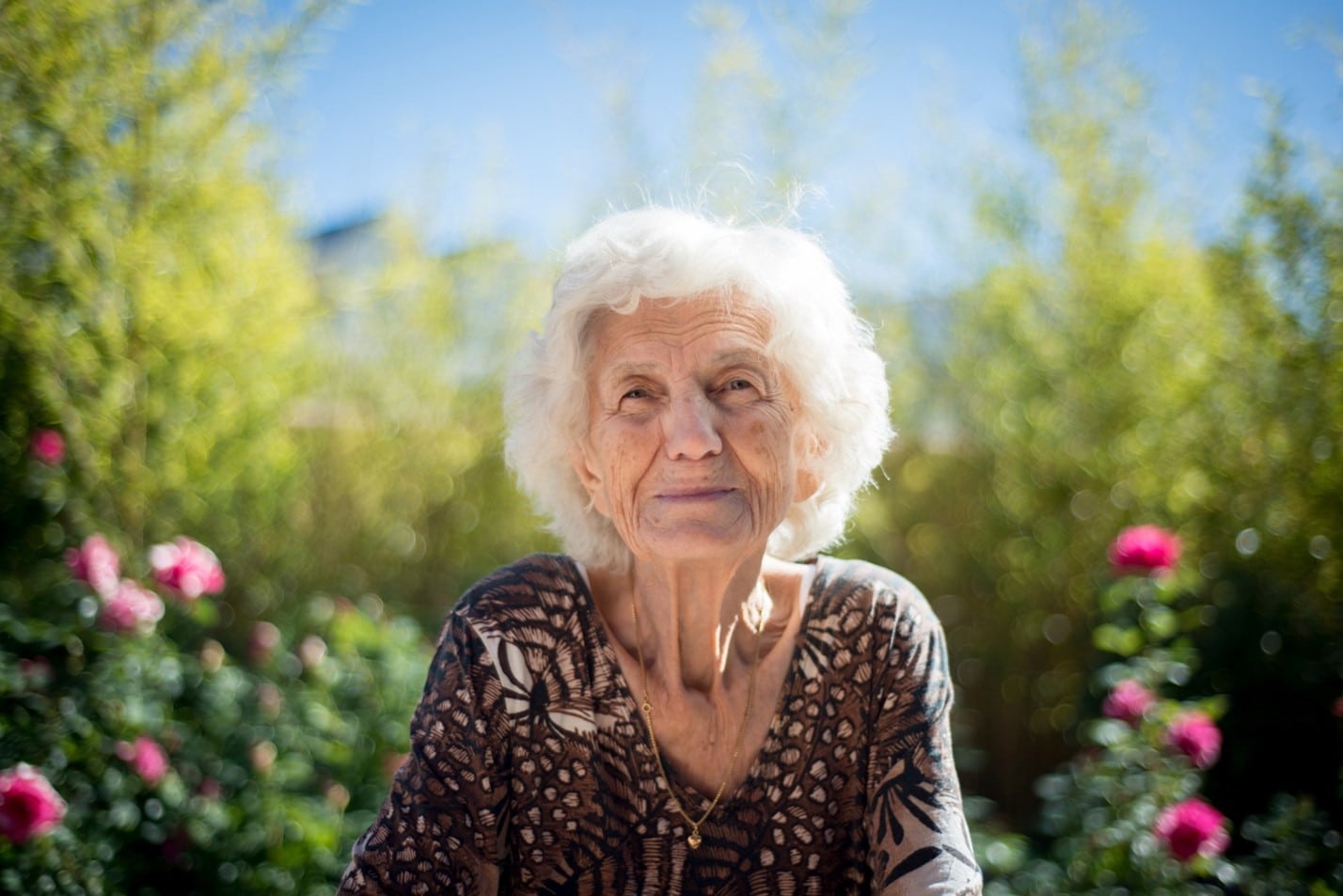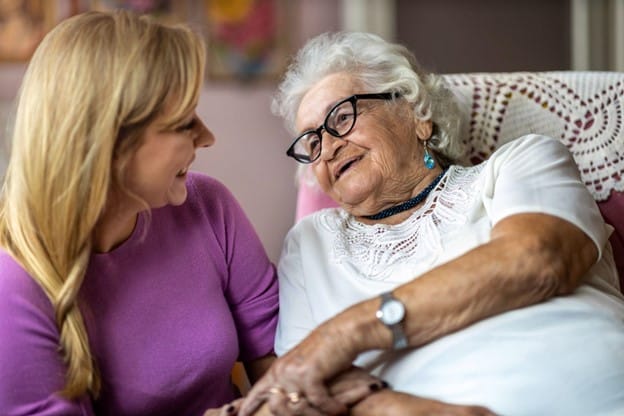Transitioning From Assisted Living to Memory Care: When To Make the Move

When a senior loved one already resides in an assisted living community, the decision to move them into a memory care community can feel incredibly difficult. As an adult child, you naturally want to ensure your parent or loved one receives the best possible care.
While challenging, this transition can significantly enhance their safety, well-being, and overall quality of life.
Here, we’ll look at signs for when it’s time to move from assisted living to memory care to help you make informed and empowered decisions and also explore tips to make this transition as smooth as possible through careful planning and understanding.
Key Takeaways:
- Transitioning a loved one from assisted living to memory care can be a positive step toward ensuring they receive the specialized support and care they need to thrive.
- Common signs that indicate the need for memory care include wandering, aggression, declining cognitive function, and increased difficulty with activities of daily living.
- Moving into a memory care community offers many benefits, including specialized care, support for physical and cognitive needs, and opportunities for social interaction.
- Planning ahead, focusing on the positive aspects of memory care, and seeking support can help make the transition smoother for both residents and their families.
Common Signs It’s Time for Memory Care
As a loved one with dementia continues their journey in senior living, you might notice subtle or even dramatic changes in their behavior, abilities, and overall well-being. It’s essential to stay aware of these changes, as they might indicate that it’s time to consider a memory care community. Here are some common signs to watch for:
Wandering
Early-stage dementia wandering might involve occasional forgetfulness of routes or destinations. However, when wandering becomes frequent, poses a serious safety risk, or cannot be easily managed in an assisted living environment, it signals the need for specialized care.
If, despite the assisted living staff’s best efforts, wandering persists and safety becomes a major concern, it’s time to consider a more secure environment.
Aggression
If aggression is mild (verbal outbursts and irritability) and happens infrequently, assisted living staff might be able to manage it with proper techniques and support.
When the assisted living staff can no longer provide safe, effective care or handle the de-escalation of these aggressive episodes, it’s time to consider a setting specifically designed for managing this behavioral challenge.
Cognitive Decline
While some forgetfulness is normal with age, rapid decline or significant impairment in judgment, problem-solving or language could mean dementia.
If forgetfulness is constantly interfering with the ability to perform basic tasks like dressing, bathing, eating independently or managing medications, it may be time for memory care’s additional support.
Physical Decline
Many assisted living residences incorporate accessibility features like grab bars, walk-in showers, and wider hallways. These features are designed to support seniors with typical age-related mobility challenges.
When dementia significantly impacts mobility and balance and increases fall risk, it could be time for a safer setting in memory care.
Consider Input From Community Team Members and Healthcare Providers
The team at your loved one’s assisted living community, along with any healthcare professionals involved in their care, is well positioned to observe changes in cognition, behavior, and overall well-being.
Here’s why recommendations from community team members and healthcare professionals should be taken very seriously:
Frontline Observations
Assisted living team members interact with your loved one daily, witnessing changes in their behavior, abilities, and care needs firsthand. They may notice subtle or significant declines before you do.
Understanding Progression
Those with experience in senior care understand the trajectory of dementia and potential complications that may arise. They can help you anticipate needs and prepare for transitions of care.
Early Intervention
Early intervention and appropriate care adjustments are crucial for maximizing your loved one’s safety and quality of life and slowing the progression of decline as much as possible.
Support for Your Decision
Recommendations from professionals validate your own concerns, strengthen your case if other family members disagree, and give you confidence that you’re exploring the best options for your loved one.
Who Should Make the Decision for a Loved One To Move to Memory Care?
Ultimately, the decision of whether to move a loved one to memory care is a complex one and ideally involves collaborative input from family and healthcare providers. It’s important to include your loved one in the decision-making process as much as possible to respect their autonomy and unique preferences.
Tips for Transitioning to Memory Care
Moving a loved one into a memory care community can be a positive step toward ensuring their safety, comfort and well-being. Here are a few tips to help make the transition a smooth and comfortable process for you and your loved one:
Focus on the Benefits
While there might be many emotions involved in the transition, focus on the positive aspects of memory care. Consider the specialized support, social engagement opportunities, and increased safety your loved one will experience.
Plan for a Smooth Move
Planning the move in stages and keeping things as familiar as possible will minimize stress. Include your loved one in the process as much as their cognitive capacity allows, and bring treasured belongings to personalize their new space. This will help create a sense of home and comfort.
Embrace Familiar Routines
Maintaining consistent daily routines and familiar activities provides a sense of structure and predictability, which can be especially comforting for individuals with dementia. Schedule dining and snacks at the same times each day, offering familiar foods your loved one enjoys.
Incorporate aspects of your loved one’s past routines into their care plan, such as preferred bathing times or specific ways they like things done.
How Memory Care Enhances Quality of Life
Memory care communities offer a range of specialized benefits designed to support the well-being of those living with dementia. Let’s look at some potential ways memory care can enhance quality of life:
Specialized Healthcare Staff
Memory care staff members are trained to manage the complex healthcare needs associated with dementia. This includes training in dementia-specific care techniques, strategies to support those with cognitive decline, and the ability to understand and respond to behavioral changes.
Opportunities for Social Connection
Structured activities, social programs, and supportive interactions tailored to those with dementia foster a sense of belonging and connection. Social connection is vital for overall well-being and can reduce feelings of isolation and depression.
Medication Management
Individuals with dementia often have complex medication regimens. Memory care team members are qualified to administer medications, monitor for side effects, and ensure medications are taken correctly and on time.
Specialized Therapies
Memory care may offer therapies like cognitive stimulation, music therapy or reminiscence therapy to support cognitive function, reduce agitation, and promote emotional well-being.

Finding Support and Gaining Peace of Mind
The decision to move a loved one to memory care is a significant step toward ensuring your loved one’s best possible quality of life. Memory care communities, like ours at Cascade Living Group, offer a unique environment where specialized programs, compassionate caregivers, and secure surroundings create a sense of belonging and purpose for those with dementia.
If you’re looking for a place where warmth, person-centered care, and a dedication to well-being are paramount, find a Cascade Living Group community near you to discover the possibilities and gain peace of mind knowing your loved one is always in the best hands.


